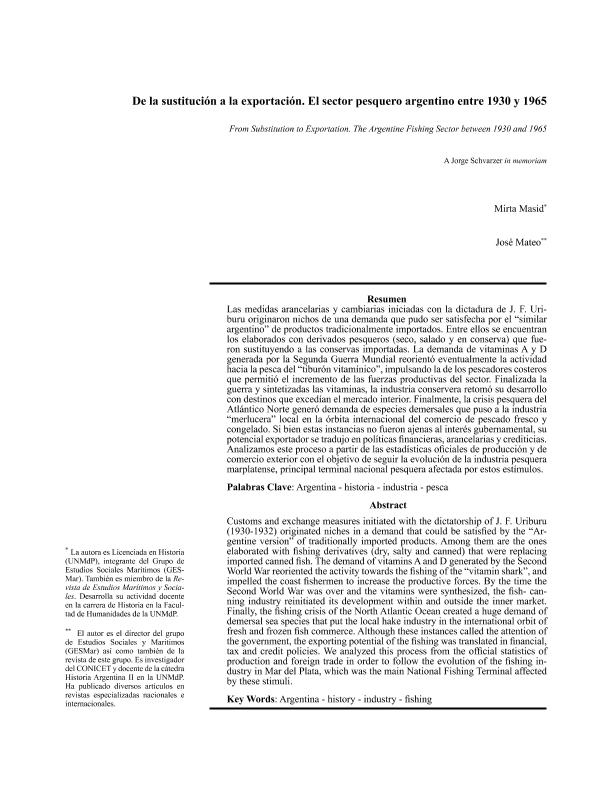Mostrar el registro sencillo del ítem
dc.contributor.author
Masid, Mirta
dc.contributor.author
Mateo, Jose Antonio

dc.date.available
2017-05-16T21:51:05Z
dc.date.issued
2008-11
dc.identifier.citation
Masid, Mirta; Mateo, Jose Antonio; De la sustitución a la exportación. El sector pesquero argentino entre 1930 y 1965; GESMar; Revista de Estudios Marítimos y Sociales; 1; 11-2008; 71-81
dc.identifier.issn
1852-0669
dc.identifier.uri
http://hdl.handle.net/11336/16569
dc.description.abstract
Las medidas arancelarias y cambiarias iniciadas con la dictadura de J. F. Uriburu originaron nichos de una demanda que pudo ser satisfecha por el “similar argentino” de productos tradicionalmente importados. Entre ellos se encuentran los elaborados con derivados pesqueros (seco, salado y en conserva) que fueron sustituyendo a las conservas importadas. La demanda de vitaminas A y D generada por la Segunda Guerra Mundial reorientó eventualmente la actividad hacia la pesca del “tiburón vitamínico”, impulsando la de los pescadores costeros que permitió el incremento de las fuerzas productivas del sector. Finalizada la guerra y sintetizadas las vitaminas, la industria conservera retomó su desarrollo con destinos que excedían el mercado interior. Finalmente, la crisis pesquera del Atlántico Norte generó demanda de especies demersales que puso a la industria “merlucera” local en la órbita internacional del comercio de pescado fresco y congelado. Si bien estas instancias no fueron ajenas al interés gubernamental, su potencial exportador se tradujo en políticas financieras, arancelarias y crediticias. Analizamos este proceso a partir de las estadísticas oficiales de producción y de comercio exterior con el objetivo de seguir la evolución de la industria pesquera marplatense, principal terminal nacional pesquera afectada por estos estímulos.
dc.description.abstract
Customs and exchange measures initiated with the dictatorship of J. F. Uriburu (1930-1932) originated niches in a demand that could be satisfied by the “Ar- gentine version” of traditionally imported products. Among them are the ones elaborated with fishing derivatives (dry, salty and canned) that were replacing imported canned fish. The demand of vitamins A and D generated by the Second World War reoriented the activity towards the fishing of the “vitamin shark”, and impelled the coast fishermen to increase the productive forces. By the time the Second World War was over and the vitamins were synthesized, the fish- canning industry reinitiated its development within and outside the inner market. Finally, the fishing crisis of the North Atlantic Ocean created a huge demand of demersal sea species that put the local hake industry in the international orbit of fresh and frozen fish commerce. Although these instances called the attention of the government, the exporting potential of the fishing was translated in financial, tax and credit policies. We analyzed this process from the official statistics of production and foreign trade in order to follow the evolution of the fishing in- dustry in Mar del Plata, which was the main National Fishing Terminal affected by these stimuli.
dc.format
application/pdf
dc.language.iso
spa
dc.publisher
GESMar
dc.rights
info:eu-repo/semantics/openAccess
dc.rights.uri
https://creativecommons.org/licenses/by-nc-sa/2.5/ar/
dc.subject
Historia
dc.subject
Pesca
dc.subject
Producción
dc.subject
Comercio
dc.subject.classification
Otras Historia y Arqueología

dc.subject.classification
Historia y Arqueología

dc.subject.classification
HUMANIDADES

dc.title
De la sustitución a la exportación. El sector pesquero argentino entre 1930 y 1965
dc.title
From Substitution to Exportation. The Argentine Fishing Sector between 1930 and 1965
dc.type
info:eu-repo/semantics/article
dc.type
info:ar-repo/semantics/artículo
dc.type
info:eu-repo/semantics/publishedVersion
dc.date.updated
2017-05-16T20:37:24Z
dc.journal.number
1
dc.journal.pagination
71-81
dc.journal.pais
Argentina

dc.journal.ciudad
Mar del Plata
dc.description.fil
Fil: Masid, Mirta. Grupo de Estudios Sociales Marítimos; Argentina. Universidad Nacional de La Plata. Facultad de Humanidades y Ciencias de la Educacion; Argentina
dc.description.fil
Fil: Mateo, Jose Antonio. Consejo Nacional de Investigaciones Científicas y Técnicas. Oficina de Coordinación Administrativa Parque Centenario. Museo Argentino de Ciencias Naturales "bernardino Rivadavia". Estación Hidrobiológica de Puerto Quequén (sede Quequén); Argentina. Grupo de Estudios Sociales Marítimos; Argentina. Universidad Nacional de La Plata; Argentina
dc.journal.title
Revista de Estudios Marítimos y Sociales
dc.relation.alternativeid
info:eu-repo/semantics/altIdentifier/url/http://estudiosmaritimossociales.org/wp-content/uploads/2016/05/rems-nc2ba-1_p72-82-2.pdf
Archivos asociados
